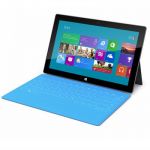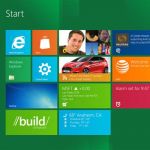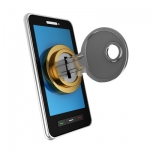Have you ever gotten a message that just makes your heart sink in your chest? Like, your dread piques the moment you see it? Chances are pretty good that your team members feel that way whenever you send them a particular message, particularly during certain times. Let’s consider why this may be the case, and how you can better manage your communications to more effectively communicate with your team.
Directive Blogs
Many businesses, seeking to balance the positives brought by remote work to the value that in-person, face-to-face operations have to offer, have leaned into hybrid work practices. This has led to many reconsidering how their office space is set up. Let’s dive into how these considerations are now shaping the workplace.
With remote work becoming the norm for many businesses in their efforts to maintain operations in recent months, this potentially company-saving adoption has not been without its drawbacks. Most notably, the mental health of many employees has been impacted as teams have been working together while keeping apart, in large part because the quick conversations that happen throughout the workday have largely been eliminated.
As we continue to adapt to a post-coronavirus world, one of the biggest issues facing businesses is their ability to communicate with their customers and team. As social distancing has reduced face-to-face interactions, many businesses are turning to digital solutions like VoIP to communicate effectively.
Shadow IT is no laughing matter, despite its overly theatrical name, as it describes the rogue technology and software being used in your business without being cleared or vetted. While it has always been a problem with in-house operations, the widespread adoption of remote work has made it even more dangerous.
Smartphones are basically the most popular piece of technology ever. They can be used for much of the computing that people deem necessary. It’s no surprise that since they pay over $1,000 for these devices that your employees are going to take them everywhere, including your office. There was a time when employers were horrified by this fact, but today smartphones can just as easily be used for work as they are for distraction.
A lot of people aren’t aware that working from home is not a recent innovation. It can arguably be traced back over a million and a half years, when our ancestors would work relatively close to their dwelling places. Throughout our history, work has shifted away and back again to the remote methodology. Let’s look back through the years to see the progression of how people worked, based on the technology that was available.
As current events have made congregating in an office irresponsible and hazardous, many companies are sustaining their operations by enabling remote work. While we normally focus on how you should properly take care of your technology, we wanted to shift our focus momentarily to the people using this technology, and how they can do so more safely.
To do so, we have to consider ergonomics.
At any given time, a business needs to consider its security, but this need only exacerbates when its employees are working remotely. With the coronavirus pandemic still in play, the likelihood is that your employees are in this situation has risen dramatically. In order to maintain your organizational security, you need to consider the many factors that a remote workforce can introduce.
The COVID-19 pandemic has greatly disrupted daily life, restricting people to their homes and preventing them from going into the office to work. In response, many companies are hurriedly changing over to a remote-capable workforce and having their employees work from home. This strategy can be highly effective, but if a company and its team isn’t careful, it can also be risky.
It’s not uncommon where a situation arises and you will find yourself working from home. To make this work, it is important that you keep a few additional issues in mind so that you can make the most of it. We have put together a few simple best practices that you should keep in mind as you operate remotely.
There are many reasons that your team may want (or need) to work from home, and there are many reasons to allow them to do so. A 2019 survey by OwlLabs indicated that 71 percent of remote workers are happy with their job (as compared to 55 percent of on-site workers); remote workers responded that they are 13 percent more likely than onsite workers to stay in their current job for five more years than onsite workers will; and when respondents claimed to be working longer than 40 hours per week, onsite workers were doing so out of necessity, while remote workers did so out of desire and enjoyment.
As the coronavirus outbreak creates global health concerns, we wanted to address how it could impact businesses that lack the preparations needed to account for such an event. More specifically, we wanted to discuss why events like these add even more reasons that a file share and sync solution is an invaluable addition to your IT resources.
Technology has become so commonplace in the office environment that work can be done from just about anywhere on any device. This has led to many organizations implementing a remote workforce--at least some of the time. There are actually several benefits to remote work, even for the employer, surprisingly enough.
Over the past couple years we've seen a huge shift in the reliability and functionality of the tablet PC. What was once was a struggling market of just a few overpriced, bulky, devices that were neither practical nor stylish has become the next big consumer product. Tablets have been making it into the business world, supplementing smartphones as a new addition to mobile arsenals. We're going to highlight the best two tablets on the market that you can buy right now.
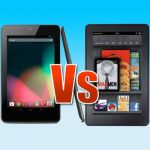 When making a tablet purchase for your business, there are many factors to take into account, such as portability, battery life, screen resolution and more. However, the most important factors are whether or not the device will actually help you get more done. Here are the Nexus 7 and Kindle Fire tablets side-by-side for your comparison.
When making a tablet purchase for your business, there are many factors to take into account, such as portability, battery life, screen resolution and more. However, the most important factors are whether or not the device will actually help you get more done. Here are the Nexus 7 and Kindle Fire tablets side-by-side for your comparison.
 The consumer electronics market is inundated with countless mobile devices with flashy interfaces, sleek profiles, and names that are more ridiculous than most car makes. Understandably, it's hard to keep up and when picking out a smartphone for yourself or your business, the demos at the store don't give you much of an insight. Here's an extensive cheat sheet on what to look for when making a new smartphone purchase.
The consumer electronics market is inundated with countless mobile devices with flashy interfaces, sleek profiles, and names that are more ridiculous than most car makes. Understandably, it's hard to keep up and when picking out a smartphone for yourself or your business, the demos at the store don't give you much of an insight. Here's an extensive cheat sheet on what to look for when making a new smartphone purchase.
Business owners and executives aren't always chained to their desk. Sometimes opportunities take you out of the office, out of town, and on the road. Traveling to vendor shows, conferences, training, expos, or even hitting the greens for a few days doesn't mean you need to be totally inaccessible. It's becoming increasingly simple to for the traveling business person to stay connected and get things done even when not at the office.
Are you the kind of person who takes meticulous notes? Do you carry around a pen and pad with you so you never forget a single line item from meetings, presentations, or your grocery list? Enter Evernote, a free application that gives you an easy-to-use note taking solution that syncs your notes across multiple devices.
Busy business owners don't always have time to be technically savvy. Sure, you can pick things up pretty quickly, but when it comes down to the latest technology, you simply don't have the time to sit down and do the research. Walking down any electronics aisle you are likely to be bombarded by choices. Remember when it used to be simple? (Wait, it was never simple!) Let's classify some of the modern devices out there for mobility geared towards someone just like you.
Tablets are definitely becoming a staple in the consumer electronics world. For the longest time, the tablet PC was an expensive, clunky device that just didn't wow consumers. Some businesses had adopted tablets back in the day, but they were difficult to use, hard to support, and they simply didn't perform for the price tag. However, like many consumer electronics, Apple reinvigorated the tablet market with the original iPad, and now it would seem tablets are here to stay. The question is, are they right for businesses?
Unfortunately cell phone service providers are discovering that smartphone users love their bandwidth. With the majority of carriers dropping unlimited data plans, when a user goes over their limit massive charges can apply. Let's cover a few tips to limit the amount of bandwidth you use on your smartphone.
 Technology is changing quickly and businesses are seeing a wide variety of options replacing traditional IT methodology that is driving change and productivity to businesses of all sizes. It's getting easier to take work with you with mobile devices and hosted services, but are these just expensive new toys or do they provide serious benefits to businesses?
Technology is changing quickly and businesses are seeing a wide variety of options replacing traditional IT methodology that is driving change and productivity to businesses of all sizes. It's getting easier to take work with you with mobile devices and hosted services, but are these just expensive new toys or do they provide serious benefits to businesses?
Techies get pretty excited over neat new gadgets and integrating them into day-to-day life, so when we heard about Sony's new SmartWatch, it caught our attention. Will smart watches become the next thing in the not-so-distant future or will they become flops like New Coke and Betamax?
 Android users may have some cause for concern. Considering its surging popularity, there is going to be a certain amount of rouge applications and other malware that targets the top iPhone OS. According to the popular anti-virus maker, Trend Micro, there are at least 20,000 applications that are malicious that target Google's Android OS. That is an increase of at least 400% since the beginning of 2012. By Christmas of this year, experts have given a conservative estimate that puts potential malware and rouge apps at around 150,000 different applications.
Android users may have some cause for concern. Considering its surging popularity, there is going to be a certain amount of rouge applications and other malware that targets the top iPhone OS. According to the popular anti-virus maker, Trend Micro, there are at least 20,000 applications that are malicious that target Google's Android OS. That is an increase of at least 400% since the beginning of 2012. By Christmas of this year, experts have given a conservative estimate that puts potential malware and rouge apps at around 150,000 different applications.
 Modern technology makes it easy to get things done from anywhere, allowing employees to work while on the go. One of the caveats of working while traveling is keeping focused. Unlike sitting in the office where an employee can focus, traveling puts workers in busy airports, coffee shops, or poolside at a hotel. Here are a few tips to help you focus on tasks while on the road.
Modern technology makes it easy to get things done from anywhere, allowing employees to work while on the go. One of the caveats of working while traveling is keeping focused. Unlike sitting in the office where an employee can focus, traveling puts workers in busy airports, coffee shops, or poolside at a hotel. Here are a few tips to help you focus on tasks while on the road.
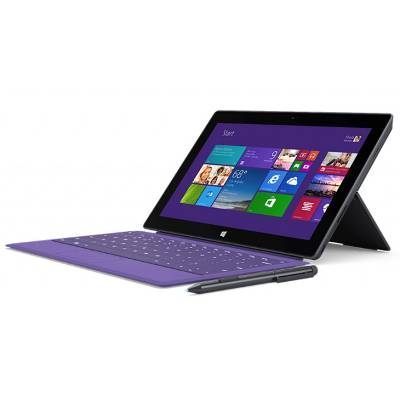 Microsoft is well known for their software, but manufacturing tablet computers is a new venture for the tech giant. It's been almost a year since Microsoft's signature tablet the Surface Pro was released, and now the second generation of Surface, the Surface Pro 2, is available. Here's an overview on how the new tablet stacks up.
Microsoft is well known for their software, but manufacturing tablet computers is a new venture for the tech giant. It's been almost a year since Microsoft's signature tablet the Surface Pro was released, and now the second generation of Surface, the Surface Pro 2, is available. Here's an overview on how the new tablet stacks up.
 As expected, mobile technology is a consistent part of daily business operations for many companies around the world. Employees love taking advantage of the mobility these devices offer, making their home office just as useful as their in-house workstation. However, a mobile device management solution needs to be strictly adhered to in order to optimize security and guarantee that a stray smartphone doesn’t expose your data to unexpected eyes.
As expected, mobile technology is a consistent part of daily business operations for many companies around the world. Employees love taking advantage of the mobility these devices offer, making their home office just as useful as their in-house workstation. However, a mobile device management solution needs to be strictly adhered to in order to optimize security and guarantee that a stray smartphone doesn’t expose your data to unexpected eyes.
 The modern office has been heavily influenced by technology. Today, offices revolve around computers, but even before computers became commonplace, offices were still designed around the technology of their time. As we're witnessing technology change the world, the modern office is sure to follow suit.
The modern office has been heavily influenced by technology. Today, offices revolve around computers, but even before computers became commonplace, offices were still designed around the technology of their time. As we're witnessing technology change the world, the modern office is sure to follow suit.
 The advantage of staying on top of the latest technology trends is that your business can utilize the newest solutions designed to give your company the competitive edge. New technology makes doing business easier and increases profits. There are three hot technology trends in 2014 that you should know about. We've looked at two trends already, now to our third, mobile computing.
The advantage of staying on top of the latest technology trends is that your business can utilize the newest solutions designed to give your company the competitive edge. New technology makes doing business easier and increases profits. There are three hot technology trends in 2014 that you should know about. We've looked at two trends already, now to our third, mobile computing.
 Remember back when buying mobile devices for your business meant choosing between a handful of laptops? Thanks to the increased proliferation of devices like smartphones, tablets, netbooks, and the development new hybrid models, it's become quite the task to pick out the right make and model. Here are five questions to consider when picking out mobile devices for your organization.
Remember back when buying mobile devices for your business meant choosing between a handful of laptops? Thanks to the increased proliferation of devices like smartphones, tablets, netbooks, and the development new hybrid models, it's become quite the task to pick out the right make and model. Here are five questions to consider when picking out mobile devices for your organization.
 By now the vast majority of people have settled into using the Internet as a 24-hour shopping center, where almost anything imaginable can be purchased and shipped right to your door. From goods to services, everything under the sun has a digital price tag. While most of us have used a credit card to buy something online, many of us have alternatively chosen a more secure option, especially when closing deals with individuals on online auction sites like eBay. That option has traditionally been PayPal, which in many ways, has helped to revolutionize the way people transfer money. In fact, PayPal has been so successful, and essential to eBay's success, that eBay bought the company in 2002.
By now the vast majority of people have settled into using the Internet as a 24-hour shopping center, where almost anything imaginable can be purchased and shipped right to your door. From goods to services, everything under the sun has a digital price tag. While most of us have used a credit card to buy something online, many of us have alternatively chosen a more secure option, especially when closing deals with individuals on online auction sites like eBay. That option has traditionally been PayPal, which in many ways, has helped to revolutionize the way people transfer money. In fact, PayPal has been so successful, and essential to eBay's success, that eBay bought the company in 2002.
 Apple is at it again. After record breaking sales of the new iPhone 5s, Apple announced a new product line with confidence. CEO Tim Cooke and his staff recently launched new MacBook models, the Mac Pro workstation, a new OS, a new iPad mini model, and the most anticipated highlight; the new iPad Air.
Apple is at it again. After record breaking sales of the new iPhone 5s, Apple announced a new product line with confidence. CEO Tim Cooke and his staff recently launched new MacBook models, the Mac Pro workstation, a new OS, a new iPad mini model, and the most anticipated highlight; the new iPad Air.
 In our last blog article, we introduced the IT trend of employees bringing in their personal devices to work (BYOD). We looked at 5 ways BYOD can help your business, but BYOD is not without risks. In part 2, we will cover five risks BYOD brings to your company's network and what you can to do manage them.
In our last blog article, we introduced the IT trend of employees bringing in their personal devices to work (BYOD). We looked at 5 ways BYOD can help your business, but BYOD is not without risks. In part 2, we will cover five risks BYOD brings to your company's network and what you can to do manage them.
 The latest trend in business technology is employees bringing in their personal devices to work. This trend is commonly referred to as BYOD (Bring Your Own Device), and it's presenting businesses with both new opportunities and challenges. We will breakdown BYOD into 2 parts; benefits and risks. In part 1, we will look at five benefits of BYOD.
The latest trend in business technology is employees bringing in their personal devices to work. This trend is commonly referred to as BYOD (Bring Your Own Device), and it's presenting businesses with both new opportunities and challenges. We will breakdown BYOD into 2 parts; benefits and risks. In part 1, we will look at five benefits of BYOD.
 As the mobile device market is booming, more employees are bringing in their own device to work (BYOD). Advantages to BYOD include a workforce that's mobile, increased employee satisfaction, and more; but using personal devices comes with risks, and business owners must consider these risks before allowing BYOD in their office.
As the mobile device market is booming, more employees are bringing in their own device to work (BYOD). Advantages to BYOD include a workforce that's mobile, increased employee satisfaction, and more; but using personal devices comes with risks, and business owners must consider these risks before allowing BYOD in their office.
 If you're in retail, then you know the satisfaction of the loud "ka-ching" sound your cash register makes at the end of a transaction. It's a great sound, which is why you mimic it after draining a three-pointer in basketball. Although, with the way technology is trending, the famous "ka-ching" noise may soon be forgotten.
If you're in retail, then you know the satisfaction of the loud "ka-ching" sound your cash register makes at the end of a transaction. It's a great sound, which is why you mimic it after draining a three-pointer in basketball. Although, with the way technology is trending, the famous "ka-ching" noise may soon be forgotten.
 The fact that over half of all working adults own a smartphone is changing not only the way we do business, but also how we interact as a species. With the development of smart glasses and watches, we are seeing technology becoming even more intertwined with our bodies, effectively turning people into cyborgs.
The fact that over half of all working adults own a smartphone is changing not only the way we do business, but also how we interact as a species. With the development of smart glasses and watches, we are seeing technology becoming even more intertwined with our bodies, effectively turning people into cyborgs.
 You have worked hard to gather and develop the perfect team and build a profitable business. It may have taken years to train your team in the intricacies of your business, and teach them to work together as a cohesive unit. Then life happens and messes up everything. When life hits, what can you do to save your team?
You have worked hard to gather and develop the perfect team and build a profitable business. It may have taken years to train your team in the intricacies of your business, and teach them to work together as a cohesive unit. Then life happens and messes up everything. When life hits, what can you do to save your team?
 There's a tidal wave of different consumer devices available on the market; smartphones, tablets, laptops, netbooks, and much more. Employees love their devices and love bringing them to work. If your company is allowing for Bring Your Own Device (BYOD), then you will want professional support to get the most out of it.
There's a tidal wave of different consumer devices available on the market; smartphones, tablets, laptops, netbooks, and much more. Employees love their devices and love bringing them to work. If your company is allowing for Bring Your Own Device (BYOD), then you will want professional support to get the most out of it.
 Technology that allows employees to work remotely from home is easy for businesses to implement. Yet, many employers are hesitant to setup their staff with a remote solution because trust is an issue. A webcam is a great tool for remote sessions because it allows employees to prove that they using company time appropriately.
Technology that allows employees to work remotely from home is easy for businesses to implement. Yet, many employers are hesitant to setup their staff with a remote solution because trust is an issue. A webcam is a great tool for remote sessions because it allows employees to prove that they using company time appropriately.
 The cool thing about using mobile devices equipped with tools that will allow you to remotely access your company's files from anywhere, is that you now have the freedom to work from literally anywhere. Just be careful not to abuse this freedom. Here are 4 tips to help you work on the go without annoying everybody around you.
The cool thing about using mobile devices equipped with tools that will allow you to remotely access your company's files from anywhere, is that you now have the freedom to work from literally anywhere. Just be careful not to abuse this freedom. Here are 4 tips to help you work on the go without annoying everybody around you.
A new technology trend is equipping workers with high-powered mobile devices, like tablets, smartphones, laptops, and more--at the worker's own expense. Employees are bringing their tech into work in order to be more efficient and productive while at the office. Is your organization ready for the Bring Your Own Device revolution?
 According to a recent survey by Experian Marketing Services, the average American spends approximately 58 minutes per day on their smartphone. Those of us who are gadget lovers may respond by saying, "One hour, is that all?" A device taking up one hour per day has huge implications with how we both live and do business.
According to a recent survey by Experian Marketing Services, the average American spends approximately 58 minutes per day on their smartphone. Those of us who are gadget lovers may respond by saying, "One hour, is that all?" A device taking up one hour per day has huge implications with how we both live and do business.
 We are smack-dab in a mobile revolution. With any large-scale societal change brought on by technology, there are growing pains involved. Nowhere is this more evident than in the business world. How can you make this major technological shift benefit your business? Consider that the individuals that work in your office have indubitably been in open competition in their acquisitions of the newest mobile devices. Since they are buying them anyway, determining ways to harness the power of these devices to work for your company’s benefit is a sound strategy. Here are a list of some of the top-selling mobile devices of 2012 and what each manufacturer has on the horizon for 2013.
We are smack-dab in a mobile revolution. With any large-scale societal change brought on by technology, there are growing pains involved. Nowhere is this more evident than in the business world. How can you make this major technological shift benefit your business? Consider that the individuals that work in your office have indubitably been in open competition in their acquisitions of the newest mobile devices. Since they are buying them anyway, determining ways to harness the power of these devices to work for your company’s benefit is a sound strategy. Here are a list of some of the top-selling mobile devices of 2012 and what each manufacturer has on the horizon for 2013.
 In the first two parts of our Vanity IT series, we’ve gone over how some of the top smartphones and tablets can potentially bring additional productivity to your workplace with a proper Bring Your Own Device (BYOD) and Mobile Device Management strategies. In our final edition of our Vanity IT series, we will go into other mobile devices that can present your company IT solutions and solve many of your remote computing problems.
In the first two parts of our Vanity IT series, we’ve gone over how some of the top smartphones and tablets can potentially bring additional productivity to your workplace with a proper Bring Your Own Device (BYOD) and Mobile Device Management strategies. In our final edition of our Vanity IT series, we will go into other mobile devices that can present your company IT solutions and solve many of your remote computing problems.
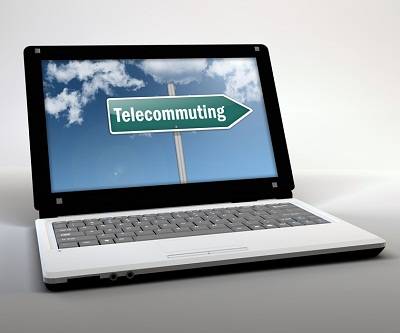 Have you ever felt like your long commute is draining the life out of you? If you commute long distances to work, then there may be something to the phrase, “My commute is killing me.” Research has shown commuters die younger than those who live closer to their work. This is yet another reason to work from home.
Have you ever felt like your long commute is draining the life out of you? If you commute long distances to work, then there may be something to the phrase, “My commute is killing me.” Research has shown commuters die younger than those who live closer to their work. This is yet another reason to work from home.
 A growing business is always in expansion mode. More revenue means that more employees will need to be hired. Every new person on-boarded will require a workstation. Adding more computers to your network will require more resources from your network, requiring you to expand your network. When you need to expand your network, you can save expansion costs by going wireless.
A growing business is always in expansion mode. More revenue means that more employees will need to be hired. Every new person on-boarded will require a workstation. Adding more computers to your network will require more resources from your network, requiring you to expand your network. When you need to expand your network, you can save expansion costs by going wireless.
 The consumer adaptation of mobile devices continues to skyrocket. In America, there is a 46% ownership rate of smartphones among adults, this according to Pew Research. Tablets are also a booming market, projected to sell 1.2 billion units in 2013. If your business is not taking advantage of this trend, then you may be missing out on a golden opportunity.
The consumer adaptation of mobile devices continues to skyrocket. In America, there is a 46% ownership rate of smartphones among adults, this according to Pew Research. Tablets are also a booming market, projected to sell 1.2 billion units in 2013. If your business is not taking advantage of this trend, then you may be missing out on a golden opportunity.
 Bring Your Own Device (BYOD), is changing the look and feel of the modern office. As the ownership rate of mobile devices among American adults creeps closer to reaching 50%, more gadgets are showing up around the office, and they are being used to get work done! If you have yet to embrace BYOD in your office, then you will want consider these 3 advantages.
Bring Your Own Device (BYOD), is changing the look and feel of the modern office. As the ownership rate of mobile devices among American adults creeps closer to reaching 50%, more gadgets are showing up around the office, and they are being used to get work done! If you have yet to embrace BYOD in your office, then you will want consider these 3 advantages.
 With the widespread use of mobile devices in the workplace, more companies are questioning the relevance of their traditional IT infrastructure. Mobile devices take advantage of cloud computing, and every new generation of tablets and smartphones have productivity apps that can accomplish more tasks. Before you switch out your old technology, you will first want to consider the data needs of your business.
With the widespread use of mobile devices in the workplace, more companies are questioning the relevance of their traditional IT infrastructure. Mobile devices take advantage of cloud computing, and every new generation of tablets and smartphones have productivity apps that can accomplish more tasks. Before you switch out your old technology, you will first want to consider the data needs of your business.
 The smartphone market is possibly the most competitive in computing. It's no secret that Apple and Samsung are competitors. Earlier this year in California, a federal jury sided with Apple in a ruling that found Samsung infringed on software and design patents. When the two aren't duking it out in court, they are battling in the marketplace.
The smartphone market is possibly the most competitive in computing. It's no secret that Apple and Samsung are competitors. Earlier this year in California, a federal jury sided with Apple in a ruling that found Samsung infringed on software and design patents. When the two aren't duking it out in court, they are battling in the marketplace.
 In business, you will gladly take every advantage that you can in regards to communications. This is because better communications will positively impact everything you do. Switching your phones system from a traditional carrier to a Voice over IP (VoIP) internet solution will not only give your business a communications edge, but also save you 50-70% on your phone bill.
In business, you will gladly take every advantage that you can in regards to communications. This is because better communications will positively impact everything you do. Switching your phones system from a traditional carrier to a Voice over IP (VoIP) internet solution will not only give your business a communications edge, but also save you 50-70% on your phone bill.
 With 46% of American adults owning a smartphone, the Bring Your Own Device (BYOD) to work revolution is here to stay. BYOD may be convenient for employees, but it also presents challenges for IT network security. To complicate the matter further, we are now seeing a new revolution with Bring Your Own Application to work (BYOA).
With 46% of American adults owning a smartphone, the Bring Your Own Device (BYOD) to work revolution is here to stay. BYOD may be convenient for employees, but it also presents challenges for IT network security. To complicate the matter further, we are now seeing a new revolution with Bring Your Own Application to work (BYOA).
 Windows has been on tablets for years. In fact, one of the first prototype tablets, the NCR-produced model 3125 notepad computer ran the Microsoft Windows for Pen Computing software for the Windows 3.1 operating system (OS). Today, 21 years later the software giant has ventured back into the portable-computing hardware arena with the Microsoft Surface Tablet.
Windows has been on tablets for years. In fact, one of the first prototype tablets, the NCR-produced model 3125 notepad computer ran the Microsoft Windows for Pen Computing software for the Windows 3.1 operating system (OS). Today, 21 years later the software giant has ventured back into the portable-computing hardware arena with the Microsoft Surface Tablet.
 Over the past two decades, the Portable Document Format (PDF), developed by Adobe Systems, has become the industry standard for clean and secure documents. There are many PDF-viewing applications available across the various app markets. However, you can't go wrong with Adobe's sleek-looking and versatile PDF reader, Adobe Reader X.
Over the past two decades, the Portable Document Format (PDF), developed by Adobe Systems, has become the industry standard for clean and secure documents. There are many PDF-viewing applications available across the various app markets. However, you can't go wrong with Adobe's sleek-looking and versatile PDF reader, Adobe Reader X.
 Time is money. Benjamin Franklin offered up that poignant piece of business acumen in his 1748 pamphlet Advice to the Young Tradesman, Written by an Old One. Travel to the present day and it's one of the most frequent sayings used by businesses professionals. Attempting to find the highest degree of productivity is the goal for everyone that believes that the bottom line is, in fact, the bottom line. One expanding technology that is helping businesses increase efficiency is the Global Positioning System (GPS).
Time is money. Benjamin Franklin offered up that poignant piece of business acumen in his 1748 pamphlet Advice to the Young Tradesman, Written by an Old One. Travel to the present day and it's one of the most frequent sayings used by businesses professionals. Attempting to find the highest degree of productivity is the goal for everyone that believes that the bottom line is, in fact, the bottom line. One expanding technology that is helping businesses increase efficiency is the Global Positioning System (GPS).
 Stories about smartphones getting wet usually have a funny twist to them, unless it is your own device, in which case the story is comparable to a Shakespearean tragedy. Whether your toddler threw your iPhone in the toilet, or your Galaxy S3 took up swimming, there are a few tricks you can try before dropping cash on a new device.
Stories about smartphones getting wet usually have a funny twist to them, unless it is your own device, in which case the story is comparable to a Shakespearean tragedy. Whether your toddler threw your iPhone in the toilet, or your Galaxy S3 took up swimming, there are a few tricks you can try before dropping cash on a new device.
 September 21st is the official launch date for Apple's iPhone 5. In typical Apple hype, they officially released the specs one week before launch, putting an end to wild rumors and ruining underpants all around the MacHead community. If you are an Apple aficionado, upgrading to the iPhone 5 will be a knee-jerk reaction, but if you find yourself on the fence then check out what's new.
September 21st is the official launch date for Apple's iPhone 5. In typical Apple hype, they officially released the specs one week before launch, putting an end to wild rumors and ruining underpants all around the MacHead community. If you are an Apple aficionado, upgrading to the iPhone 5 will be a knee-jerk reaction, but if you find yourself on the fence then check out what's new.
 Intel has been conducting experiments that would make electricity pioneer Nikola Tesla proud. Intel plans to get consumers charged up over their newest technology that will allow laptops to provide electricity to nearby smartphones without cables. Enough with the electricity puns - we're just ecstatic about this new technology!
Intel has been conducting experiments that would make electricity pioneer Nikola Tesla proud. Intel plans to get consumers charged up over their newest technology that will allow laptops to provide electricity to nearby smartphones without cables. Enough with the electricity puns - we're just ecstatic about this new technology!
 Think back a few years ago before the Apple ipad (if you are in the medical field, there is a good chance you'll relate to this). Remember back when "tablet" computers were essentially laptops sans-keyboard with little plastic styluses? Now kindergarteners are using tablets instead of chalk boards. What happened?
Think back a few years ago before the Apple ipad (if you are in the medical field, there is a good chance you'll relate to this). Remember back when "tablet" computers were essentially laptops sans-keyboard with little plastic styluses? Now kindergarteners are using tablets instead of chalk boards. What happened?
 Today, your employees are more and more technologically empowered. With the consumer electronics market teaming with amazing gadgets and high-end devices, cool tech is no longer reserved for fancy geek toys. With employees bringing in their own smartphones and tablets, mobile security becomes a big concern for small businesses.
Today, your employees are more and more technologically empowered. With the consumer electronics market teaming with amazing gadgets and high-end devices, cool tech is no longer reserved for fancy geek toys. With employees bringing in their own smartphones and tablets, mobile security becomes a big concern for small businesses.
Whether you are going completely paperless or just want to send digital copies of paper documents, there are a lot of solutions out there for quickly scanning a doc and converting it to PDF for easy archiving and emailing, but most of these devices aren't exactly portable. Here's a quick way to digitize documents with the camera on your Android smartphone.
We talk a lot about smartphones and tablets as business tools, but these days more and more people are using high-end devices personally. It's likely that they are bringing these devices in to work, and often using them to become more productive at their job. We call this Bring-Your-Own-Device, or BYOD, and it isn't a bad thing. The catch is managing security risks when users are using their own personal gadgets.






